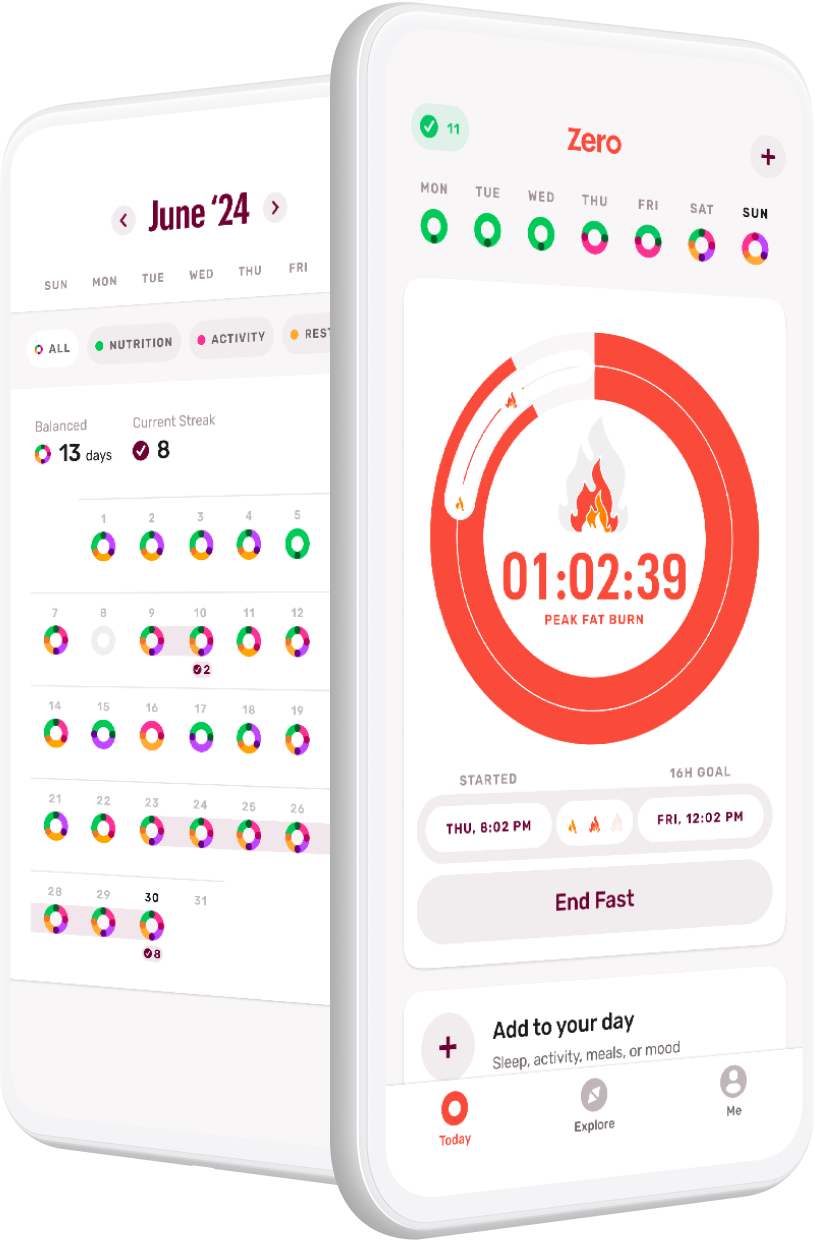Written and medically reviewed by Katya Meyers, RD
Finding motivation for fasting is similar to finding motivation for other goals you are trying to achieve — it can ebb and flow day to day, or even moment to moment. This is especially true if you are new to fasting. The good news is that finding your fasting motivation can result in big benefits, from weight loss to lower cholesterol. Whether you’re gearing up for your first intermittent fast or your motivation for fasting just needs a refresh, keep reading for inspiration and encouragement.
How to Find Intermittent Fasting Motivation and Encouragement
You may be surprised to learn that motivation comes from action, not the other way around! Therefore, if you are new to intermittent fasting, one of the best ways to find the initial motivation for fasting is to simply begin. Once you get started, you will likely find that increased motivation for fasting will follow.
If you still find your motivation for fasting slipping, or just need a little extra fasting encouragement from time to time, try honing in on one or more of the strategies below.
Tip #1: Know Your Why
Knowing your “why” is an important part of reaching any goal. It’s only natural that your intermittent fasting journey is going to feel challenging from time to time. Connecting to the reason you decided to prioritize your health with fasting can help you power through.
Spend some time thinking about your deeper motivation for fasting. Importantly, your first answer is probably not your “true” answer. For example, when asked “Why are you fasting?” many people will say they want to lose weight or lower their cholesterol. However, on a deeper level, what they really want is something bigger — to stay healthy for longer, so they can spend more quality time with their friends and family, for instance.
Rather than only seeking fasting motivation from a specific number on the scale, try identifying benefits that can paint your “why” more vividly. Consider the renewed energy you will have for larger life goals, such as the energy to travel, improve your mental focus, or find the ability to be more active with your family.
Another factor to consider is whether your motivation for fasting is focused on internal or external factors. Research shows that you can maintain health behaviors better when your motivators are more internal, as opposed to external. In other words, you are more likely to succeed in maintaining your fasting habit if you focus on the desire to please yourself than if you do it for others.
Once you’ve found your deeper motivation for fasting, the next question to ask yourself is: “Is fasting right for me?” While most people can safely begin a fasting habit, it is not for everyone. For example, women who are pregnant, trying to become pregnant, or breastfeeding should first seek medical advice.
If you meet any of the criteria below, fasting might not be right for you at this time:
- You have a pre-existing medical condition
- You are pregnant, trying to become pregnant, or breastfeeding
- You are under the age of 18
- You currently struggle, or have previously struggled, with disordered eating
Tip #2: Set Realistic Goals
People are best motivated by achievement and the anticipation of achievement. This is why setting smaller, short-term goals is so effective — you feel the “win” of the achievement sooner and more often! Conversely, if you fail to meet goals on a regular basis, it can result in a lack of motivation. Even the most highly motivated individuals can have a hard time if a task is too difficult, complex, or feels too distant. However, if you believe your goal is within reach, you are more likely to carry out the behaviors needed to reach it.
Setting short-term health goals that act as stepping stones towards your ultimate desired outcome is the best way to stay motivated for fasting. Rather than setting a goal of losing 20 pounds, for example, aim to complete a certain number of fasts each week.
And your first fast doesn’t need to be — and in fact, should not be — extreme. Rather than attempting a 24-hour water-only fast right away, start with a short fasting window. A 16:8 (or 16-hour fasting window with an 8-hour eating window) is a popular approach to intermittent fasting, but you can still reap many of the benefits with just a 12-hour fast. Then, gradually increase your fasting window by eating breakfast later or dinner earlier, 15–30 minutes at a time.
Tip #3: Learn More About the Benefits of Fasting for Health and Longevity
Fasting is about more than just weight loss. Research shows that fasting improves nearly every system in the human body and is one of the keys to longevity. Put quite simply, when it is done consistently, fasting can help you live a longer and healthier life.
One of the main ways that fasting staves off the degenerative effects of aging and improves longevity is by allowing your body to burn fat (in the form of ketone molecules), as opposed to carbohydrates (in the form of glucose), for fuel. One specific benefit of burning ketones is that it activates the release of an important molecule called brain-derived neurotrophic factor, or BDNF, in the brain. BDNF helps your brain build and strengthen neural connections and improve cognitive function, which often declines significantly with age.
Additionally, fasting spontaneously reduces the number of calories you consume. In turn, this can lead to weight loss as well as weight maintenance, and it can also activate biochemical pathways that may help you live a longer, healthier life. Long-term calorie restriction of roughly 30% has been shown to increase the lifespan of laboratory animals, likely by helping reduce inflammation and oxidative stress (i.e., DNA damage).
While long-term caloric restriction is difficult to study in human beings, many of the biomarkers of human disease and aging — insulin resistance, inflammation, blood pressure, triglyceride levels — are improved by regular intermittent fasting. Thus, intermittent fasting allows you to experience similar results and benefits of long-term caloric restriction without the difficulty of chronic deprivation.
Lastly, talk with your doctor about getting routine blood work. Seeing your biomarkers improve may provide some fasting encouragement!
Tip #4: Focus On the Positive Effects of Fasting
Some positive effects of fasting are noticeable right away, while others take longer to manifest. As your fasting habit takes hold, you may find it helpful to focus on the short-term benefits of fasting, such as more energy, clearer thinking, or a quicker morning routine (because meal prep and eating take time!).
Another positive effect of intermittent fasting is that you will likely feel less hungry (not more!) in between meals. This is yet another benefit of increasing your body’s ability to utilize fat for fuel. As this transition occurs and you become more “metabolically flexible,” you’ll likely find you have more stable energy and less hunger throughout the day, even when waiting longer in between meals.
When it comes to long-term benefits that provide motivation for fasting, protection against lifestyle-related disease is a top contender. When cells are continually bathed in glucose from recent meals, they lose their sensitivity to insulin, which can lead to diabetes and poor glucose control. Fasting helps reverse this trend. Spending long periods without eating increases insulin sensitivity, thereby reducing the risk of metabolic disease.
Fasting also promotes autophagy, or “programmed cell death.” While this may sound like a bad thing, autophagy protects against disease (including many types of cancer) and aging by removing the damaged cells in your bloodstream. Then, when you break your fast, your body regenerates newer, healthier cells. It’s like deep cleaning for your body!
Tip #5: Visualize Your Healthy Future
Fasting is the perfect first step towards better health because there is a low barrier to entry. That’s because it’s something that almost everyone can try, you can start any time, and it’s free! In fact, every human being already practices fasting at least once during a 24-hour period while they sleep.
Perhaps best of all, fasting can also trigger a chain reaction of other healthy habits. Studies show that intermittent fasting can improve your nutrition by reducing late-night snacking and encouraging healthy eating choices, such as lower alcohol consumption. When you stop eating 2–3 hours before bedtime, the quality of your sleep improves, you’ll fall asleep faster, and you’ll wake up feeling refreshed. When you fast while you exercise, you’ll spend more time in the Fat-Burning Zone, so your workouts will yield better results. Visualize all of these successes as you attain your new, healthy, fasting-forward lifestyle to stay motivated and make progress towards your health goals.
Tip #6: Reward Yourself
There’s nothing like a reward to stay motivated for fasting! After a big win, like extending your fasting window for a few more hours, you certainly deserve a reward to celebrate your success. However, a reward doesn’t have to (and ideally shouldn’t) come in the form of an indulgent food that moves you away from your healthy targets. New workout gear, a massage, or a movie with a friend can be just as fulfilling as a fudge sundae when it comes to providing fasting encouragement. Sure, once in a while, a dessert is in order. But, most of the time, choose rewards that will support your intermittent-fasting progress so you can keep achieving these incremental wins and moving towards your health goals.
Tip #7: Find a Fasting Accountability Buddy
Like any challenge in life, intermittent fasting is better with a friend. Finding an accountability buddy is one of the best (and most enjoyable!) ways to set and achieve health goals. Besides providing accountability and companionship, an accountability partner can also provide motivation for fasting.
Not only does a fasting accountability buddy help keep fasting fun, but research shows that time spent strengthening social bonds is good for your health. Spending leisure time with friends is associated with a reduced risk of depression, high blood pressure, and an unhealthy BMI. Authors of one large-scale study found that those with strong social bonds were 50% less likely to die prematurely.
Whether it’s a lifelong friend or someone you recently met at the gym, find an accountability buddy who will help keep you motivated on your fasting journey. Make sure to establish a regular check-in to help one another stay on track, share your thoughts on the best Fast-Breaker recipes, and celebrate wins.
Tip #8: Download the Zero App
An accountability buddy is great, but sometimes you need science-backed help right away. That’s where Zero comes in. Zero provides tools and resources to help you stay accountable and empower your health journey. (Check out Zero 101 for tips and strategies to start your first fast as well as a little fasting encouragement.)
Ready to start using Zero? Take the quiz or download the app today.
- The Fasting Guide to Menopause, Perimenopause, and Postmenopause - April 8, 2024
- Try This Instead of That: How to Bookend Your Fasts - March 25, 2024
- 60 Names for Sugar: The Myths, The Facts, and What You Should Know - February 12, 2024


